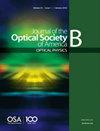腔光磁学中法拉第效应的光正交压缩
IF 1.9
4区 物理与天体物理
Q3 OPTICS
Journal of The Optical Society of America B-optical Physics
Pub Date : 2023-11-13
DOI:10.1364/josab.501448
引用次数: 0
摘要
相干操纵正交压缩在精密测量应用中是非常需要的,但由于在大多数微纳米结构中难以达到标准量子限制,仍然具有挑战性。本文提出了一种在腔光磁系统中产生正交压缩的有效方案。考虑到法拉第效应诱导的磁子-光子相互作用,我们报道了在符合Bogoliubov变换的模式分裂理论的有效谐振腔模式中可以实现强正交压缩。利用实验可获得的参数,我们证明了增加磁子-光子耦合强度或输入场强度有助于提高输出光谱强度和光谱的压缩量,其中完美压缩仅位于单谐振腔模式的位置。有趣的是,通过调整输入场的频率和强度,可以在有效谐振腔模式的双频处实现近乎完美的正交压缩。本文章由计算机程序翻译,如有差异,请以英文原文为准。
Optical quadrature squeezing via Faraday effect in Cavity Optomagnonics
Coherently manipulating quadrature squeezing is highly desired for precision measurement applications, but remains challenging due to an inaccessible standard quantum limit in most micro- and nanostructures. Here, we propose an efficient scheme to generate quadrature squeezing in a cavity optomagnonical system. Taking the magnon–photon interaction induced by the Faraday effect into consideration, we report that a strong quadrature squeezing can be achieved in the effective resonant cavity modes that obey the mode-splitting theory of Bogoliubov transformation. Using experimentally achievable parameters, we illustrate that increasing the magnon–photon coupling strength or input field intensity contributes to improving both the output spectral intensity and the amount of squeezing of the spectra, where perfect squeezing is only located at the position of the single resonant cavity mode. Interestingly enough, the nearly perfect quadrature squeezing at the double frequencies of the effective resonant cavity modes can be achieved by adjusting the input field frequency and intensity.
求助全文
通过发布文献求助,成功后即可免费获取论文全文。
去求助
来源期刊
CiteScore
4.00
自引率
5.30%
发文量
374
审稿时长
2.1 months
期刊介绍:
The Journal of the Optical Society of America B (JOSA B) is a general optics research journal that complements JOSA A. It emphasizes scientific research on the fundamentals of the interaction of light with matter such as quantum optics, nonlinear optics, and laser physics. Topics include:
Advanced Instrumentation and Measurements
Fiber Optics and Fiber Lasers
Lasers and Other Light Sources from THz to XUV
Light-Induced Phenomena
Nonlinear and High Field Optics
Optical Materials
Optics Modes and Structured Light
Optomechanics
Metamaterials
Nanomaterials
Photonics and Semiconductor Optics
Physical Optics
Plasmonics
Quantum Optics and Entanglement
Quantum Key Distribution
Spectroscopy and Atomic or Molecular Optics
Superresolution and Advanced Imaging
Surface Optics
Ultrafast Optical Phenomena
Wave Guiding and Optical Confinement
JOSA B considers original research articles, feature issue contributions, invited reviews and tutorials, and comments on published articles.

 求助内容:
求助内容: 应助结果提醒方式:
应助结果提醒方式:


